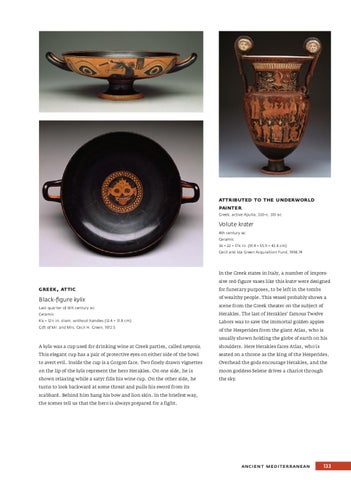attributed to the underworld painter Greek, active Apulia, 330–c. 310 bc
Volute krater 4th century bc Ceramic 36 × 22 × 17¼ in. (91.4 × 55.9 × 43.8 cm) Cecil and Ida Green Acquisition Fund, 1998.74
In the Greek states in Italy, a number of impres-
greek, attic Black-figure kylix
sive red-figure vases like this krater were designed for funerary purposes, to be left in the tombs of wealthy people. This vessel probably shows a
Last quarter of 6th century bc
scene from the Greek theater on the subject of
Ceramic
Herakles. The last of Herakles’ famous Twelve
4 7/* × 12M in. diam. without handles ( 12.4 × 31.8 cm)
Labors was to save the immortal golden apples
Gift of Mr. and Mrs. Cecil H. Green, 197 2.5
of the Hesperides from the giant Atlas, who is usually shown holding the globe of earth on his
A kylix was a cup used for drinking wine at Greek parties, called symposia.
shoulders. Here Herakles faces Atlas, who is
This elegant cup has a pair of protective eyes on either side of the bowl
seated on a throne as the king of the Hesperides.
to avert evil. Inside the cup is a Gorgon face. Two finely drawn vignettes
Overhead the gods encourage Herakles, and the
on the lip of the kylix represent the hero Herakles. On one side, he is
moon goddess Selene drives a chariot through
shown relaxing while a satyr fills his wine cup. On the other side, he
the sky.
turns to look backward at some threat and pulls his sword from its scabbard. Behind him hang his bow and lion skin. In the briefest way, the scenes tell us that the hero is always prepared for a fight.
ancient mediterranean
3121-02 DMA handbook Ancient [MEW 11-3].indd 133
133
11/4/11 5:42 PM
